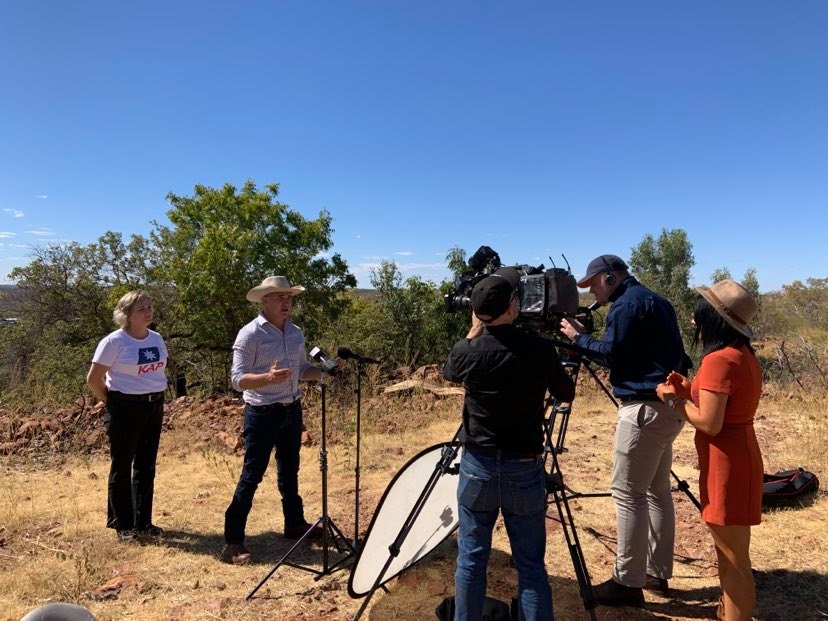
27 Jul KAP reignites calls for Kajabbi youth facility
Katter’s Australian Party has this week reignited calls for the State Government to pursue Relocation Sentencing as a circuit-breaker to the state’s escalating youth crime crisis.
The policy, which is the KAP’s cornerstone solution to growing crime rates in regional centres like Townsville, Cairns, Mackay, Rockhampton and Mount Isa, would provide magistrates and judges an alternative sentencing option when dealing with young people.
At the weekend, KAP Leader Robbie Katter, Federal MP Bob Katter and KAP candidate for Thuringowa Julianne Wood visited the party’s proposed site for the state-funded youth reform centre at Lake Julius near Kajabbi, about 100km north of Mount Isa.
Robbie Katter said the overwhelming cost of keeping inmates at Townsville’s Cleveland Juvenile Detention Centre, along with all-time high crime rates, meant urgent action was needed.
He said while the KAP had welcomed the Palaszczuk Labor Government’s recently announced trial of on-country programs for at-risk kids, this soft approach wouldn’t go far enough in creating real change.
“The key difference is our policy provides a third sentencing option, other than juvenile detention and being let back out onto the streets, to those who are dealing with these kids in a court of law,” Mr Katter said.
Along with operating on minimum costs, the KAP’s proposed Relocation Sentencing facility will enable youth offenders to develop key life skills such trade and agricultural work.
The centre would operate in close co-operation with indigenous Elders and professional youth workers to ensure young offenders had the best shot possible at a productive and crime-free future following their release.
Importantly, it would remove the offenders from the communities they had previously targeted and also from the negative influences that lead to their criminality.
“We think getting kids away from the distractions of any city is a good starting point to engage – the difficulty becomes when kids have to go back into the communities where they have previously been in trouble,” Mr Katter said.
“Both short and long-term solutions of this crime crisis must look at its symptoms and causes: including generational unemployment, alcohol and substance abuse (including the effect in Queensland of the alcohol bans in the NT) and the effectiveness of the Youth Justice Act.
“The current state of affairs is far from a resolution and people living out here deserve the right policy that can deal with these kids effectively while at the same time trying to get them back into the community as contributors.”
Keys points of the KAP Relocation Sentencing Policy:
- Applies to young, repeat offenders aged 10-17 who have been identified as ‘at-risk’ of recidivism and have a demonstrated history of escalating criminality
- Provides alternative sentencing (and/or bail arrangement) options to Magistrates/Judges when dealing with these offenders
- These alternative sentencing options include ‘on-country’ programs in a remote and approved location. Ankle bracelets would be used for added security, but security would largely be maintained through distance and isolation
- An incentive system, based on points and certificate awards, would allow the offenders to feel a sense of achievement. This would include qualifications towards things such as a windmill technician, master butcher and stockman, but would not be limited to primary industries.
- The ultimate goal of Relocation Sentencing is to provide these children life skills, education and a sense of purpose not available to them on the streets or in juvenile detention facilities
- It would be available to both indigenous and non-indigenous children, and programs would draw heavily on the involvement and teachings of First Australian elders
- The KAP have identified a series of possible facility locations in North West Queensland, such as Lake Julius (north of Mount Isa) – it is envisioned multiple locations will be established across the state in strategic areas
- The program is designed to be the ultimate ‘circuit-breaker’ for repeat, young offenders who are likely to re-offend if returned to the streets and are at-risk of further “criminalisation” if incarcerated at juvenile detention centres.

Sorry, the comment form is closed at this time.